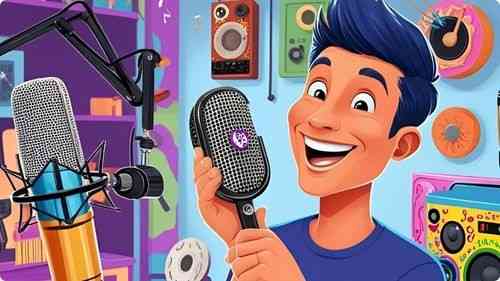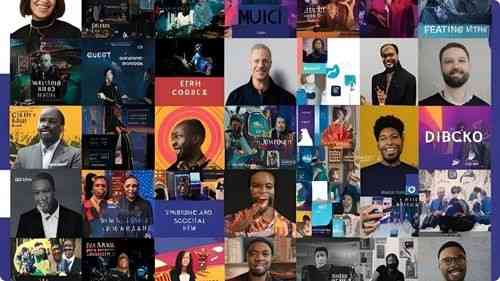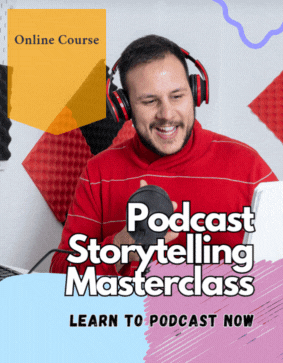5 Tips For Effective Solo Podcasting
40,436 View
Share this Video
- Publish Date:
- May 25, 2025
- Category:
- Learn to Podcast
- Video License
- Standard License
- Imported From:
- Youtube
Tags
On the surface, solo podcasting can seem a bit intimidating. Yes, it’s just you and your microphone building your episode, but there are a couple dynamics that come into play that can throw you off.
But today, we are going to unpack those dynamics, discuss how you can overcome them, and make your next solo podcast the best show you've ever done.
These tips were featured on Episode 29 of Pod Theory, a podcast I'm in the process of rebranding (stay tuned for details coming soon). In this episode, I'm sharing five easy-to-execute tips for effective solo podcasting, each designed to help you construct a solid show format, deliver your message in a clear, concise fashion, and overcome any hurdles that are tripping you up when it comes to making quality podcast content in a solo recording environment.
I want to help you take your solo podcasting skills to the next level. Click one of the links below to connect with me today.
FREE DISCOVERY SESSION:
https://jasoncercone.com/discovery
JOIN THE SOLO PODCASTER'S MASTERMIND:
https://jasoncercone.com/mastermind
1:1 SOLO PODCASTING STRATEGY SESSIONS:
60 MINUTES: https://calendly.com/jasoncercone/60strategy
120 MINUTES: https://calendly.com/jasoncercone/120strategy
-----------------------------------------
Podcast Host Masterclass
Podcasting is booming, and now is the perfect time to launch your own show! The Podcast Host Masterclass gives you the tools, tips, and techniques to become a confident, compelling podcast host—no prior experience required. Learn how to prep guests, ask powerful questions, control conversations, and grow your audience fast. Taught by industry veterans Scott Paton and Martin Wales, this course condenses decades of broadcasting experience into actionable lessons. One student doubled monthly downloads in just 9 months using these strategies! Ready to step behind the mic and build your brand? This is your chance to shine.
2 Must-Know Podcasting Tips for Your Show
Choosing the Right Equipment for Your Podcast

Selecting the appropriate equipment is fundamental to producing a high-quality podcast. Start with a reliable microphone that suits your recording environment, whether it's dynamic for noisy spaces or condenser for controlled settings. Investing in good headphones ensures accurate sound monitoring during recording and editing. Additionally, consider acquiring a pop filter to minimize unwanted sounds and a sturdy stand to maintain microphone stability. A quality audio interface can enhance sound clarity, especially if you're recording on a computer. Proper lighting and a quiet recording space also contribute to professional-sounding episodes. By carefully choosing your equipment, you set a strong foundation for your podcast’s success.
Leveraging Guest Appearances to Grow Your Audience

Featuring guests on your podcast can significantly expand your reach and attract new listeners. Select guests who are experts in your niche or have a substantial following that aligns with your target audience. Prepare thoughtful questions that allow your guests to share valuable insights and experiences, providing rich content for your listeners. Promote episodes with notable guests across both your and your guests’ networks, tapping into their audience base. Encourage guests to share the episode with their followers, increasing your podcast’s visibility. Collaborative episodes not only enhance the quality of your content but also foster relationships within your industry, contributing to your podcast’s growth and credibility.
Frequently Asked Questions
Should I use background music or sound effects in my podcast?
Background music and sound effects can enhance your podcast by setting the mood and emphasizing points. Use them sparingly to avoid distracting from the main content and maintain a professional sound.
How long should a typical podcast episode be?
Episode length can vary, but typically ranges from 20 to 60 minutes. Choose a duration that suits your content and keeps your audience engaged without overwhelming them.
What legal considerations should I be aware of in podcasting?
Ensure you have rights to any music or content used, obtain necessary permissions for guest appearances, and adhere to copyright laws. Consider including disclaimers and privacy policies as needed.
How do I grow my podcast audience?
Produce high-quality content regularly, interact with listeners, leverage social media, optimize for search engines, and seek reviews and ratings to increase visibility and attract new listeners.
Statistics
- Listeners prefer podcast episodes that range between 30 to 45 minutes, with 65% favoring this duration.
- Using transcription services can make podcasts accessible to a wider audience, increasing reach by up to 25%.
- About 60% of podcasters find that offering premium content subscriptions generates additional revenue.
- Podcasts that offer unique and niche content are 35% more likely to build a dedicated listener base.
- Podcasts that utilize analytics to refine content strategies experience a 40% improvement in listener satisfaction.
- Over 80% of podcasters report that having a dedicated website enhances their show’s visibility.
- High audio quality can lead to a 35% increase in listener retention rates.
- Podcasts with interactive segments, such as Q&A sessions, see a 25% boost in audience participation.
- About 55% of podcasters use interviews as a key strategy to provide diverse content.
- Engaging storytelling techniques can increase listener retention rates by up to 50%.
- Collaborating with other podcasters can lead to a 20% growth in listener base.
- On average, podcasters spend about 10 hours per episode from planning to publishing.
- Investing time in marketing can increase a podcast’s audience by up to 50% annually.
- Podcasts with consistent weekly releases are 60% more likely to grow their audience steadily.
- Podcasts that release episodes on Tuesdays and Thursdays see higher download rates by 30%.
- Approximately 40% of podcasters use background music to enhance the listening experience.
External Links
anchor.fm
inc.com
analytics.google.com
podcastcareers.com
canva.com
adobe.com
hootsuite.com
ahrefs.com
optimizingpodcasting.com
jeffbullas.com
socialmediaexaminer.com
podcastpage.io
buzzsprout.com
thepodcasthost.com
podcastitalia.com
convinceandconvert.com
radiopublic.com
How To
How To Create Engaging Podcast Descriptions
Creating engaging podcast descriptions attracts potential listeners by clearly conveying what your show is about and what they can expect. Start with a compelling introduction that summarizes your podcast’s theme, purpose, and the value it offers to listeners. Use clear and concise language, incorporating relevant keywords to improve searchability on podcast directories and search engines. Highlight unique aspects of your podcast, such as recurring segments, expert guests, or specific topics covered, to differentiate it from others in the same niche. Include a brief overview of the host(s) to establish a personal connection with your audience. Add a call to action, encouraging potential listeners to subscribe, leave reviews, or visit your website for more information. An engaging podcast description not only informs but also entices potential listeners to tune in and become part of your audience.















